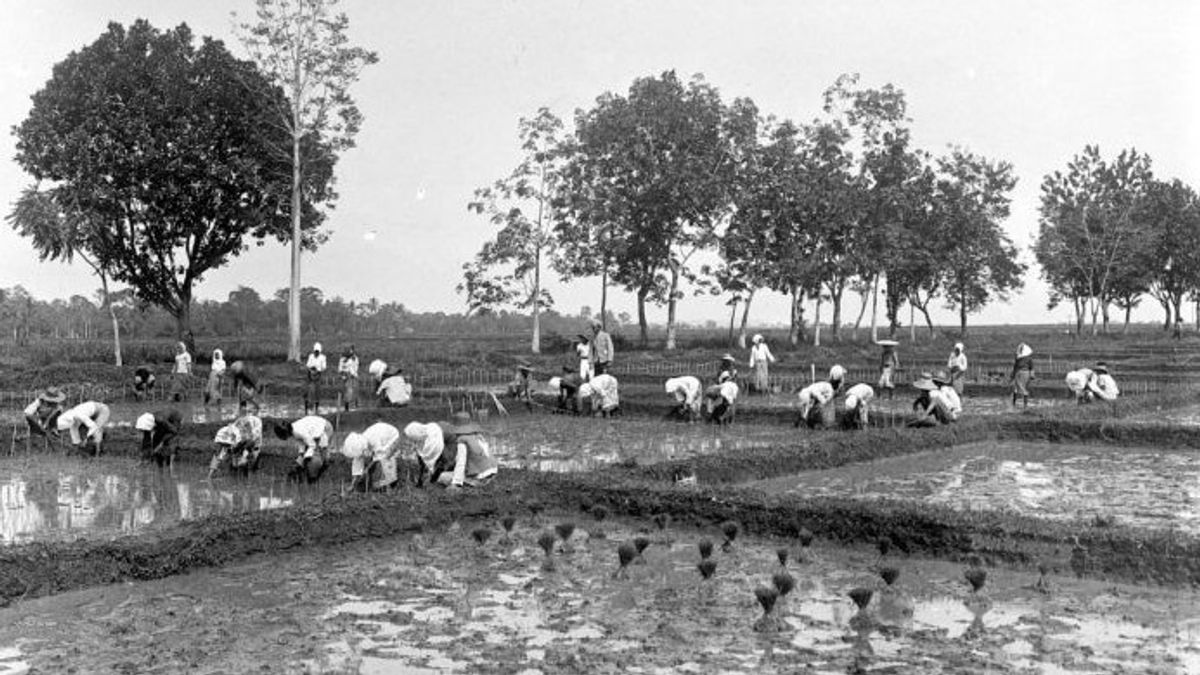JAKARTA - Large salaries for high-ranking officials are commonplace. A vital political task is the reason. This has happened since the history of the Mataram Kingdom era. The difference is, the salary is not in the form of money. Officials are given power over the people to the land. Interestingly, the matter of salary is an important aspect for an official to get a wife, which is often even more than one person.
In the tradition of the Mataram Kingdom since the 16th century, the king is the sole owner of the land. This means that the king is territorial in power over the land which is the territory of Mataram's authority. To run the economy of the kingdom, land was used as a source of income. Because the king's assets were not used to pay the officials.
On the other hand, the kingdom provided high-ranking officials with apanage or what in the Dutch term "land of wages." The king's land was distributed to officials for a certain duration. Pure land is not determined based on hectares or acres, but is determined by the number of inhabitants (count).
Historian Ong Hok Ham explained that one chunk was the same as a farmer unit consisting of four men. As a result, the financial position and political level of a high official was assessed by the number of census he received from the king. High officials can use chopping power for various purposes, from personal to royal interests.
"That's for example a royal official or a prince receives a land area of 800 cacah (peasant family). Which means that he received land large enough to be cultivated by 800 farming families or large enough so that 800 farming families could work on it. In short, the wealth and prosperity of the members of the Javanese elite were measured by population and not by land area. It is not control of territory, but control of the population that is considered important by the elite, "said Ong Hok Ham in the book Two Ages of Land Mastery (1984).
All high officials live off the land. From there it really functions as a salary for the service of high officials to the king and kingdom. The census takers were then obliged to hand over the yields of the palatine land to the officials.

Apart from compulsory work, high officials have the right to use census personnel for various needs. Once upon a time for residential purposes, the establishment of irrigation, roads, bridges, and plantations. Even when there was a war, the census were subject to military service.
"This mandatory work is carried out regularly every year on certain occasions, such as when there are royal celebrations, such as grebeg, coronation ceremonies, and also important celebrations held by apanage landowners, such as weddings, death, and so on. Another obligation that cannot be avoided from holders of land rights for apanage is compulsory military service during times of war, ”wrote Sri Margana in the book Corruption in Indonesian History Cross (2016).
In managing the land, high officials hand over power to an official at the village level called bekel. The main task of bekel is twofold. First, distributing real lands to farmers to be managed. Second, collecting part of the land products to be submitted to the landowners in the form of tribute.
Then, the distribution of the yield from the real land is two-thirds for the land owner, and two-thirds for the land management farmers. Meanwhile, the remaining third is given to bekel as compensation for his work collecting agricultural products.
Therefore, the position of bekel is often contested by the villagers. The bekel position, according to most villagers, has enough prestige, be it socially, economically, or culturally. The bekel position is like 'little king'.

On the one hand, bekel functions as a tax collector. On the other hand, bekel has the power to appoint peasants who will be given the power to cultivate the land, even though in essence bekel is the subordinate of high officials.
"If we review the definition of langat, it is clear that langat is accompanied by rights over the territory, which is evident from the right of the lurane holder to appoint his own bekel as his representative and as a tax collector," wrote Soemarsaid Moertono in the book State and Power in Century Java. XIV-XIX (2017).
"Bekel, on the other hand, was given a small grub by his master. It can be considered that the langat system is already an older institution than the crooked system, the latter system more often than not the simple way of giving a salary for services rendered. there are still signs of former government rights, ”the book continues.
[/ read_more]
Salary during the VOC transition to the Dutch East Indies
Changes in the salary system of bumiputra officials began to appear since the Dutch VOC trading partnership went bankrupt at the end of the 18th century. The VOC which was later replaced by the Dutch government during the reign of Governor General Herman Williem Daendels (1808-1811) made significant changes to the Dutch East Indies bureaucracy.
Daendels, who was a major opponent of corruption, began to pay high salaries to colonial government employees, including giving pangreh praja (bumiputra officials) a fixed salary and cultuurprocenten. Cultuurprocenten is a gift from the government for the implementers of forced cultivation (indigenous rulers, village heads).

The prize is obtained when the Pangreh Praja delivers the harvest that exceeds the stipulated conditions on time. This system lasted until the abolition of the forced cultivation system.
"The financial subsidy to the Bupatis was given between 500 guilders and 1,500 guilders for the most influential, such as the Regent of Madiun. When the small district heads were integrated into large districts (this process ended in about 1876), each district head was paid 1,500 guilders a month. They still enjoy the percentage of forced land, as do the rights to service workers (200 people) a year, and tribute and other customary rights, ”said Ong Hok Ham in another book entitled Wahyu Missing, The Land of Shakes (2018).
[/ read_more]
Living in luxury with no one wife
With the large amount of income earned, the regent class can live in luxury. In fact, the needs issued by the regent every day are far greater than those of the head of the resident (Netherlands) and the entire nuclear family (children and wife).
This is because a regent has a large family in the form of family and children. Especially if you have more than one wife. All of them - big family - were supported and given a job.
The practice of multiple wives was widespread among regents. The tradition is enduring, as revealed by Rosihan Anwar in the book The season of change, A Brief History of Indonesia 1925-1950 (1985) because in many places in Java it has a culture of offering "sleeping companions" and future wives from the village head's family to the regents.
The ability to support and the regent's power to provide jobs to wives and families were the reasons. As a small example, regents can spend large amounts of money for parties, salvation, and to feed households.
Because it is so large, one regent sometimes needs around 2,000 pikul of rice a year. Far different from ordinary Dutch or Chinese families who only carry 25 shoulders.
MEMORY Other[/ read_more]
The English, Chinese, Japanese, Arabic, and French versions are automatically generated by the AI. So there may still be inaccuracies in translating, please always see Indonesian as our main language. (system supported by DigitalSiber.id)










